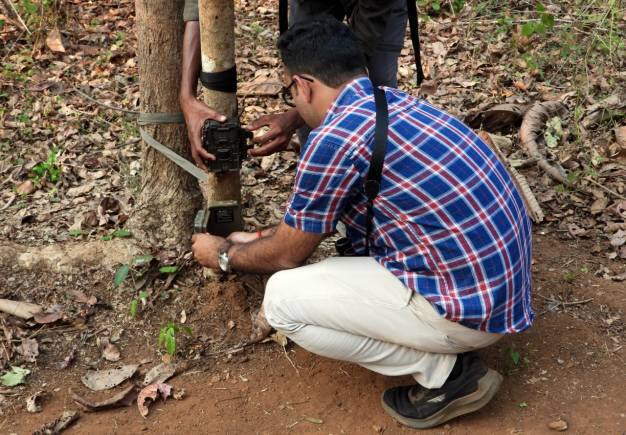



Core areas of national parks and wildlife reserves enjoy protected status under wildlife regulations, but there is much to do for forests both inside the core areas and outside, in the buffer zone. On International Day of Forests 2023, we put the spotlight on three organisations that are working in this area.
The Forest Way
A Charitable Trust based in Thiruvannamalai, Tamil Nadu, The Forest Way is focused on how to restore wildlands, live sustainably and thrive with nature.
The team has been working for close to 20 years to restore the forests of the sacred Arunachala Hill, that is part of the Eastern Ghats and has been facing large-scale degradation due to logging, fires, and overgrazing.
This is done using a multi-pronged approach that involves building a nursery of native forest plants, planting them in the monsoon, checking forest fires using education, detection, fire lines, creating a 15-acre forest park at the base of the hill, an arboretum to showcase native trees and water conservation.
As part of their work, the team has restored part of the hill with a set of native flora and is all set to introduce more of the climax species. As the closest mature forests are 35 km to the east and 50 km to the west, seed dispersal and wildlife migration is an obstacle and hence the team believes that rejuvenation via this model will create new forest corridors again.
To achieve their goal they are creating firebreaks, working on grazing protection and restoration planting. The idea also is to nurture native vegetation, improve tree diversity, and create a small habitat for endangered and endemic species.
Their work also involves the local community and they have opened a small school as well. They also want to raise environmental awareness among the children and have outreach programs at schools where they introduce nature and the need for its conservation to them.
Planet Life Foundation
Based in Goa, the Planet Life Foundation runs ‘Private Conservation Hotspots’ to assist the survival of native wildlife outside protected areas and ‘Nocturnal Mammal Monitoring’ to track the presence and survival of nocturnal mammals.
Pankaj Lad, founder, Planet Life Foundation, says, “The nocturnal mammal project model is based on conservation impact through tourism. We involve the travellers who go with us on the night safaris and we monitor numbers and track the count and maintain a data sheet with the location of their sighting."
Lad, who is also a partner in Nature's Nest Resort Goa, says the conservation hotspots idea focuses on land beyond the protected areas. "We took up this area from a local farmer which is about 15 acres of land that was destroyed for agriculture but is turning into forest again," he explains. "We are trying to create a financial model with the farmer where he is getting his revenue and the forest can regenerate with some impetus which makes it a win-win situation.”
The idea here is to conserve the habitat so that the forest can regrow. “We are trying to protect what is existing already so that it regrows. But for the forest to regrow you need to have the presence of animals and birds, so it grows naturally. And for this we have created some water holes and have a camera trap installed that has captured the presence of many mammals including leopards and several varieties of birds as well. Our team visits the water holes every day to refill the water and downloads the footage from the camera for our records. When we started, conservation only was the focus, but we wanted the community to be a part of it as they are the ones that live next to it,” says Lad.
 Camera trapping by Planet Life Foundation, Goa. (Photo by Bindu Gopal Rao)
Camera trapping by Planet Life Foundation, Goa. (Photo by Bindu Gopal Rao)
Forest Regeneration and Environmental Sustainability Trust
The team at Pune-based Forest Regeneration and Environmental Sustainability Trust (FORREST) is working to connect people with nature conservation and their work to mitigate climate change, biodiversity-loss and habitat-degradation. This is being done through habitat conservation, protection, and restoration of terrestrial ecosystems, combating desertification through reversing land degradation, wetland, and biodiversity conservation.
They work in extended protected areas, non-protected areas, in land with private ownership, builders, farmers or whoever owns land and water resources. “In protected areas we focus on ecological restorations, biodiversity conservation, wildlife corridors, invasive-species removal and habitat restoration, wildlife conservation and allied works. In non-protected areas, we work towards their protection, habitat restoration, wetlands restorations, mangrove conservation, wildlife protection, watershed development and bringing conservation issues in focus with people living around,” explains Neha Singh, founder and director, FORREST.
Working in partnership with key stakeholders, they create local, workable solutions for the conservation of nature and the sustainable use of natural resources. “Our work is supported by forest departments, municipal corporations, corporates, and individual donors. Forests, biodiversity, soil, water can be conserved if we change our way of living and how we treat this earth,” says Singh.
 A conservation awareness drive at Ratnagiri. (Photo courtesy FORREST)
A conservation awareness drive at Ratnagiri. (Photo courtesy FORREST)
Discover the latest Business News, Sensex, and Nifty updates. Obtain Personal Finance insights, tax queries, and expert opinions on Moneycontrol or download the Moneycontrol App to stay updated!
Find the best of Al News in one place, specially curated for you every weekend.
Stay on top of the latest tech trends and biggest startup news.